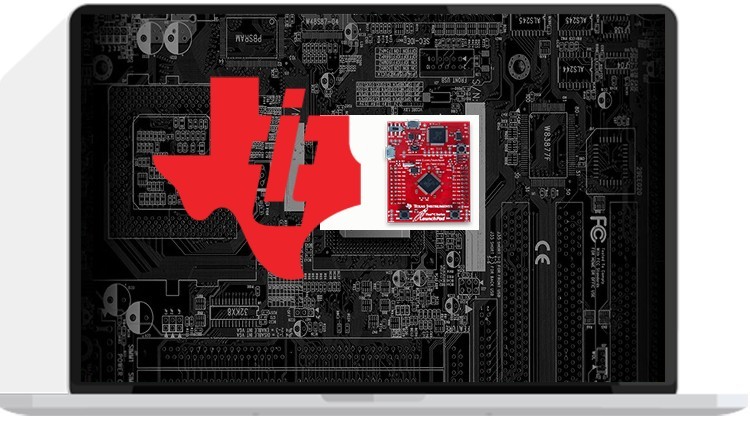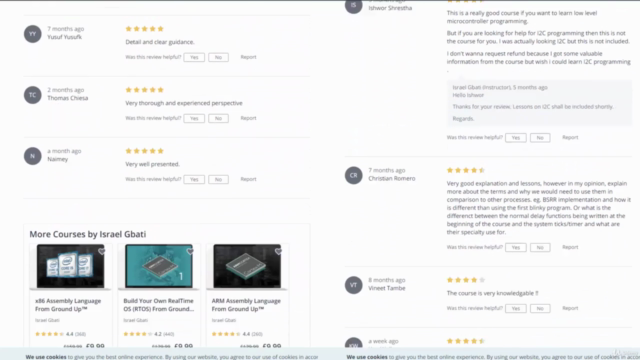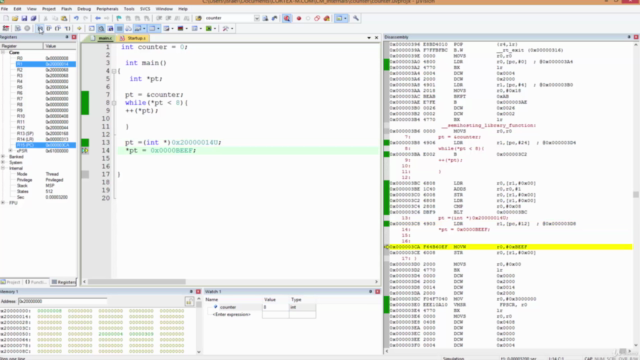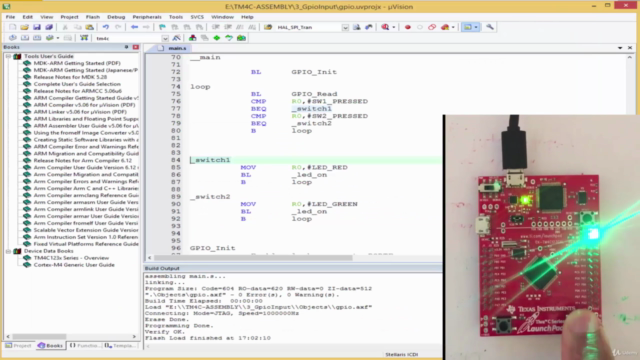Complete ARM Cortex-M Bare-Metal Programming (TM4C123)

Why take this course?
🌟 Complete ARM Cortex-M Bare-Metal Programming (TM4C123) Course 🌟
Welcome to Your Embedded Journey!
Embark on an exhilarating adventure into the world of ARM Cortex-M microcontrollers with our comprehensive online course. No prior knowledge of cortex-m or embedded C programming is required. All you need is a thirst for learning and a passion for technology.
Course Overview:
This hands-on course is meticulously designed to equip you with the practical skills necessary to delve into the internals of Cortex-M microcontrollers. You'll gain a solid foundation in bare-metal programming, mastering concepts like pointers, structures, memory navigation, and more.
Key Areas Covered:
- Pointers & Structures: Learn to manipulate data types effectively and understand how they interact within the memory space of a microcontroller.
- Memory Navigation: Gain the ability to navigate through different memory areas, including RAM, ROM, and peripheral registers with confidence.
- Cortex-M Software Interface Standard (CMSIS): Understand the CMSIS standard which simplifies the interaction between software and hardware abstraction layers of Cortex-M microcontrollers.
- Assembly Language: Work with ARM Assembly Language to directly control hardware peripherals without relying on high-level libraries.
- Peripheral Drivers: Build your own peripheral drivers using the information extracted from datasheets and manuals, ensuring a deeper understanding of the hardware you're working with.
Dive Deep into ARM Assembly Peripherals:
In this section, you will:
- Navigate Microcontroller Reference Manual: Learn to read and comprehend microcontroller reference manuals and datasheets.
- Build Peripheral Drivers: Configure and program peripherals such as ADC, UART, GPIO, TIMER, etc., in assembly language.
- Master ARM Architecture: Understand the ARM architecture and how it affects your programming decisions.
- Learn ARM Instruction Set Architecture (ISA): Get familiar with the ARM ISA to write efficient and well-structured embedded C code.
- Professional Embedded Firmware Development: Learn to build professional embedded firmware in assembly for ARM processors.
Course Highlights:
- Configure Microcontroller Peripherals: By the end of this section, you'll be proficient in configuring peripherals using assembly language.
- Troubleshoot and Debug: Learn effective debugging techniques to ensure your code is both correct and efficient.
- Cortex-M Internals: Explore the internals of Cortex-M microcontrollers to optimize performance and resource utilization.
🚀 Why Choose This Course?
- No Libraries Used: This course is focused on understanding the hardware at a fundamental level, without relying on libraries.
- Practical Approach: Learn by doing with real-world examples and hands-on exercises.
- Strong Foundation: Build a robust foundation that can be expanded upon for future learning and projects.
- Expert Instructor: Gain from the expertise of Israel Gbati, who brings a wealth of knowledge and experience in ARM Cortex-M programming.
Sign Up Today with Confidence! 💰
We're so confident that you'll find this course invaluable that we offer a FULL money back guarantee for 30 days. If you're not completely satisfied, we'll refund your investment, no questions asked.
Ready to Master ARM Cortex-M Bare-Metal Programming?
Don't miss out on this opportunity to elevate your embedded programming skills. Enroll now and let's embark on a journey to master ARM Cortex-M microcontrollers together! 🎓👍
Course Gallery




Loading charts...
Comidoc Review
Our Verdict
The Complete ARM Cortex-M Bare-Metal Programming (TM4C123) course is a well-rounded option for diving into Cortex-M internals, mastering pointers, structures, memory navigation, and debugging. It offers hands-on experience in programming UARTs, timers, and interrupts using Assembly code and CMSIS core usage with embedded-C.\n\n Despite minor issues like outdated Windows IDE instructions, a few sections appearing unorganized or missing elements, and occasional quality control concerns, the course offers practical value for learners seeking in-depth embedded systems knowledge.\n\n It is essential, however, to have patience with slower paced segments while some advanced topics might be better suited for those already familiar with embedded programming concepts.
What We Liked
- In-depth coverage of ARM Cortex-M internals, mastering pointers, structures, memory navigation, and debugging
- Comprehensive understanding of CMSIS core, enabling efficient firmware development using bare-metal embedded-C
- Practical UART, timer, and interrupt drivers' implementation in Assembly code
- Appreciated course structure, pacing, and the instructor's clear communication
Potential Drawbacks
- Reliance on Windows for IDE with outdated instructions, causing issues for some learners
- Some sections seem out of order, lack proper context, or contain inaccuracies and oversimplifications
- Minor issues include occasional slow typing, reading leading zeros excessively, and using potentially confusing terms like 'opcodes' for Assembly mnemonics
- Quality control concerns arise from the lack of slides and hardware component explanations